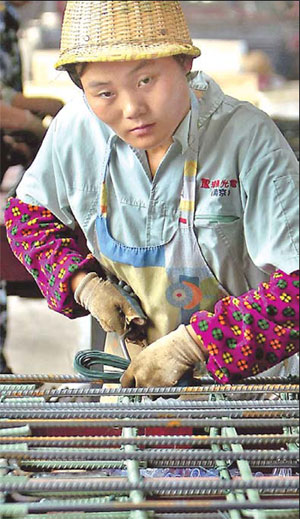Economy
Manufacturing gallops in March
By Xin Zhiming (China Daily)
Updated: 2010-04-02 09:12
 |
Large Medium Small |
PMI surge indicates strength of continued economic rebound
BEIJING: China's manufacturing picked up in March indicating the strength of the continued economic rebound, boosting hopes for possible interest rate hikes and yuan appreciation, said analysts.
| ||||
The HSBC China Manufacturing PMI, released the same day, rose to 57 in March after falling to 55.8 in February, when the indicator was affected by the lunar new year holidays and winter weather conditions.
PMI is a measure of manufacturing activity and readings above 50 indicate expansion.
The rise in PMI fueled optimistic market sentiment as Chinese equities rose to a two-month high. The benchmark Shanghai Composite Index rose 38.31, or 1.2 percent, to 3147.42 at the close.
The rising momentum of manufacturing activity could continue, analysts said.
"While some slowing is expected in sectors sensitive to government tightening, industrial activity is likely to be supported by the recovery in external demand and strengthening domestic consumption," said Jing Ulrich, managing director and chairman of China Equities and Commodities at JP Morgan.
|
 |
|
A worker at an iron rod factory in Nanjing, Jiangsu province. [China Daily] |
Analysts said the rising index indicates that the Chinese economy is likely to maintain the high growth rate it achieved in the fourth quarter of last year, when it expanded 10.7 percent year-on-year, the fastest since 2007.
"The PMI figure implies that annualized industrial output growth in March could exceed 20 percent while the gross domestic products (GDP) growth in the first quarter of this year could be up to 12 percent," said a report by Nomura Securities.
The report forecast that China's GDP growth could be 10.5 percent for the whole of 2010 and may even be higher.
But uncertainties remain for the manufacturing sector, said Ulrich. "Chinese manufacturers are facing margin pressure on a number of fronts, including higher wage costs and rising raw material prices."
With the economic expansion continuing steadily, analysts said it also provides a basis for the nation to hike interest rates amid growing risks of asset bubbles and rising inflation.
The upward trend in manufacturing could also make policymakers think in terms of making the yuan more flexible, analysts said.
China's home prices soared last year thanks to the ample liquidity in the financial system as a result of the country's massive stimulus package. Economists such as Tang Min, deputy general secretary of the China Development Research Foundation, have warned against the unaffordable effect of bursting bubbles on the national economy.
Meanwhile, the consumer price index (CPI), a major measure of inflation, rose to 2.7 percent in February from 1.5 percent in January.
Although the rise is partly attributable to the consumption boom during the lunar new year holidays, some economists have cautioned that the country's record new yuan lending of 9.59 trillion yuan ($1.4 trillion) last year could stoke inflation.
"Although March CPI inflation should be lower than February, which is usual for the month following the lunar new year, the Producer Price Index (a measure of factory-gate prices) is expected to continue rising on higher commodity and raw material prices," said Wang Tao, head of China economic research at UBS Securities.
"Underlying inflationary pressure from the recent credit expansion and property price rises is not abating," she said.
Wang said the strong growth in the first quarter could set the stage for the start of interest rate hikes and yuan appreciation.
"We expect the central bank to start raising interest rates in the second quarter, possibly in April, in order to anchor inflation expectations. This would also be a good time to move on the yuan," he said.













